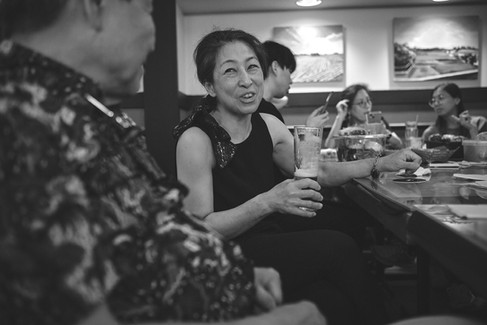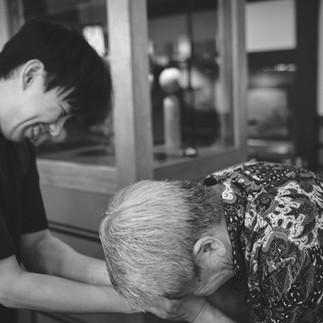C’est Japon à Suisha - 6 - The Last Day
- Vu
- Dec 6, 2023
- 11 min read
"How do you feel?"
"Honestly, lots of other people feel sadder than me. Everyone asks this question day after day . . . I feel a bit relaxed right now. I didn't have to do the shopping today. And now I have more time to do other stuff."
Shirai-san
"Same as usual. I concentrate on the task ahead of me. Customers feel it more than me. Maybe I'll feel it later tonight but for me, the day proceeds as normal."
Hiroha-san
"Not thinking about it being the last day at all. If the last moment is good, then everything that came before it was good as well."
Oda-san
"I don't know."
Arai-san
1PM on July 1, 2023

This innocuous little sign posted on the door was the only visible evidence on the restaurant's exterior that July 1 is C'est Japon a Suisha's last day.
And even inside, there wasn't anything truly overt. One had to look hard to find any hints that today was the last day.
First picture: A summary of the seating times and numbers throughout the night.
Second picture: A thank you letter to Shirai-san and Oda-san, who work tirelessly in the kitchen and are normally never seen by restaurant guests.
Third picture: Another summary of seating times, but in the kitchen, and listing additional details about the guests.
Fourth picture: Arai-san had anticipated people bringing flowers and other congratulatory gifts. He had designated a table on the first floor to place all of the gifts. While the picture above is empty, the table was full by the end of the night.
With the date of July 30 ticking closer, Arai-san decided to hold an in-person auction to sell anything he could from the restaurant. Throughout the restaurant, little white stickers were affixed to the decor in preparation for the auction.
Ever since Arai-san had announced the closure of the restaurant, the number of covers had increased to levels that staff had not thought possible. The concept of a break didn't exist anymore; just a steady push to get to the end of the day and prepare once again for the next. This was only exacerbated by the staffing issue in the kitchen, ideally a team of three chefs but only two since March 2022.
Knowing this and wanting his staff to enjoy their last day, Arai-san had concocted a plan. He had invited Oto-Wa Taiko, 音和太鼓, to do three taiko performances at 6PM, 7:30PM and 9PM. And by doing so, Arai-san had to remove a few tables in the main dining room for space for the taiko drums, effectively reducing the number of covers.
As always, Arai-san thought "From the heart."
And with this, the atmosphere and demeanour of the staff on this final day was light-hearted. While this would still be a long night, instead of their June peak of 130 covers, it was a more manageable 112.
Staff Meal
One of Oda-san's daily responsibilities is the staff meal. Even though staff meal is a small affair (other employees will arrive closer to opening), it's the one substantial meal that will carry the senior staff through the day.

Arai-san joked whether I had already taken a picture. Little did he know that I had!
This was a simple but delicious plate of yakisoba that would power all of us for the next 9-10 hours. Once the restaurant opens, there is no break for the senior staff. Arai-san usually doesn't eat until he returns home around 11PM.
Staff meal was a fun affair punctuated by a few periods of quiet reminiscence. My meagre Japanese skills caught a few words of the conversation. Specifically, kagi, which is the word for key, leading into a running joke that Oda-san had a security deposit box in the bank next door.
The conversation pivoted towards the large outpouring of messages and well-wishes coming from people who have dined over the years. The senior staff were truly surprised at the reaction from the community with specific reaction to social media, specifically the Reddit threads. Arai-san quietly joked about perhaps organizing an annual Suisha Matsuri.
It's obvious that this group has forged a bond over the past few years. I am grateful and honoured that Arai-san invited me to their staff meal.
3PM - Two more hours until opening
With the end of staff meal, there was an obvious shift in atmosphere. Everyone retreated to their stations. The background music started to play. The water started to flow throughout the restaurant. It was time to prepare the restaurant for the last night of service.
Hiroha-san brought up various pantry items he needed and prepared the last batch of sushi rice.

As always, Hiroha-san had prepared plates of salmon nigiri for the restaurant's combination dishes. Above, Oda-san is prepping the combination plates.
Shirai-san prepping and portioning out vegetables for the tendon, a special menu item consisting of a bowl of tempura on rice, that was brought back for the last week of service.
Christopher had been working at the restaurant off and on during his university years. A practitioner of kendo and martial arts, Christopher found a kindred spirit in Arai-san and bonded over their shared love of martial arts and the philosophy that underpins it.
After a break away from the restaurant, he reached out to Arai-san asking to be put on to whatever duty was available. This afternoon, he was one of two assigned cleaners and would transition to being the assigned dishwasher for the evening.

Taisei had been with the restaurant since 2017, and over that time period, had done a little bit of everything including stints in the kitchen and out in the dining room as a server. With three jobs under his belt, his immediate goal was to move to Tokyo and potentially open up his own restaurant. Today, he was the second cleaner and would help out in the kitchen during dinner service.
Taisei performing uchimizu and kadohaki. Uchimizu is the act of sprinkling water in front of one’s own house or store and has been done since the Edo era (1603-1868). Uchimizu serves a dual purpose: sprinkling water is a Shinto purification ritual but it also helps to cools down the temperature through the effect of heat vaporization during the hot summer. Kadohaki is the act of sweeping in front of one's house or storefront. Arai-san explains that this is respect for the building and for the customer.
There is also a functional reason. The loading zone for garbage from the Bank and Slater area businesses is located in front of the restaurant. The truck was designed so that it would leak when overfilled. With no immediate drainage, Arai-san or whoever was in charge of cleaning quickly learned to toss 2-3 buckets of soapy water in the morning to get rid of the smell and flies and give customers or passer-bys a more pleasant experience.
Taisei folding napkins and placing the wooden chopsticks to make place settings.

And Arai-san placing them as fast as he can before moving on to the next task.
The cost to clean the place settings and all of the cloth in the restaurant is $600/month.
4:48 PM - Twelve minutes before opening
There was already a lineup at the door. With rain threatening to come down in the usual Ottawa Canada Day tradition, Arai-san opened the doors at 4:48PM, 12 minutes before the official opening time and ran throughout the restaurant to inform everyone.
As Arai-san returned to greet guests, the following conversation and variants on it were often heard:
"How are you Arai-san?"
"Oh, I am very happi today!"
Instead of wearing his suit jacket, Arai-san had donned a blue and white happi, a piece of clothing normally worn during festivals. After a year of knowing him, Arai-san's natural state of being is one of a quiet cheerfulness. Today, that cheerfulness was an aura, almost radiant.

"I can't believe it's the last day."
Those words would be uttered from many people on this day. But to hear Casey direct those words to Spencer . . . well, those words contained hidden depths. Casey and Spencer are staff members but they are also children of two of the senior staff. They grew up here, with the restaurant and its people. Underneath their professional facades, I wonder how they felt about this piece of their childhood closing down.
Above: Arai-san had assigned all front of house duties to Casey (left) and Spencer (right). Throughout the night, they would repeatedly reference the reservation book and the seat timings, mentally ensuring that there were enough seats for everyone and potentially moving some groups as necessary.
As front of house, they greeted guests, led them to their seats, and managed the phones on top of a bevy of other minor tasks. But one aspect that stood out was their focus on cleaning the menu and the front door. Every menu that was put back into the rotation to be given to new guests was given a thorough wipe down. And that front door? By 6:48PM, Spencer had wiped it down at least 3 times. After that, I stopped counting, certain that he or Casey would do it again.
Later, I would ask Arai-san about the cleaning of the menus, curious if it was a COVID measure. And no, it was not. Having been to other restaurants, he disliked sticky menus and wanted to make sure that his customers didn't have the same experience.
Oto-Wa Taiko, 音和太鼓,
Oto-Wa Taiko was formed in 1989, after gauging interest among the members of the Ottawa Japanese Community Association. The name, Oto-Wa Taiko, has a double meaning. The two Japanese characters used, oto and wa means sound and harmony respectively, while also reflecting Ottawa as its community of origin. Taiko means drum. The character wa was chosen to symbolize the harmony among the group members as well as the harmony of spirit between the players and their drums as they make oto together.
For the first two years, they had no taiko drums and practiced on tires. During these formative years, they were fortunate to have two instructors from Montreal make the two hour drive every Sunday to teach. In 1990, Oto-Wa Taiko was asked to perform on Canada Day for Queen Elizabeth II. Thankfully, the Montreal group sent over some drums and their members to help out. That was their first official performance.
Over its 30 year history, Oto-Wa Taiko has performed 600 times.
Arai-san had cleared out a small corner on the first floor for the performance. As 6PM approached, members of the group pulled out the four drums that had been stashed in the restaurant's coat check. The second and third pictures show a standard percussion instrument called a tetto, which is created through the welding of three steel pipes, allowing for different pitch when struck. This particular tetto was made by a welding shop on Preston Street.
Earlier in the day, testing of the intercom revealed that for whatever reason, there was no sound in the basement. So as the announcement went out over the intercom, a staff member would head downstairs to inform them to head upstairs and within a few minutes, there was no space in the main dining room. The last few diners from the basement stood shoulder to shoulder in the corridor, peering around the corner for a glimpse.
It didn't matter. You didn't need to see the performance. You could feel it. With each hit of the taiko, a boom would radiate and I could feel an acute pressure move over my entire body. At first, it was at the very tip of my fingers and toes and then it slowly enveloped me until each boom was felt acutely in my chest. It took all of my effort to steady myself and not fall over.
The four drummers performed three songs: Isami Goma, Hiryu Sandan Gaeshi and Ama no Tatsuo Daikagura. Oto-Wa Taiko arranged these three songs for this particular performance to make a seamless transition from one piece to the next.
These three songs are part of the collection of sacred pieces from the Suwa shrine in Nagano Prefecture. Oguchi Daihachi, the founder of modern ensemble taiko drumming, was asked to decode sheet music found at the shrine around 1950. But once it was transferred to modern notation, he found the rhythm too simple and had the idea to have multiple people play. Thus the modern taiko ensemble was born.
Each song has its own meaning. The first song, Isami Goma, is about brave horses going into battle. The second, Hiryu Sandan Gaeshi, is about a dragon making 3 attempts to ascend to heaven and bringing peace and prosperity to everyone.
And finally, in Ama no Tatsuo Daikagura, two dancers, a young maiden and a village buffoon dance to sacred court music, as pictured above.
One of the servers would tell the kitchen that the taiko were so powerful that the reverberations knocked the exit sign in the back staircase to the ground.
Meanwhile . . .

With two kitchens on separate floors, servers were kept busy moving to and from the two kitchens via the back stairs.

In the kitchen, the tickets were slowly accumulating but not at the non-stop pace of the last few weeks. A few of the servers were able to come upstairs to watch snippets of the taiko performances before heading back to work.

Sung, Shirai-san and Oda-san strategizing how to tackle a somewhat complicated ticket before breaking to tackle their respective roles.
Lauren was the newest addition to the team, having only been hired 6 months ago. She worked 6 years at an office job before making a complete transition to the service industry. In the photo above, the servers are often in this corner as this is where the miso soup is kept warm. As part of mise en place, someone has prepared multiple bowls and stacked them.
Underneath a small cut-out of the dessert menu and numerous boxes of Strawberry Pocky was the freezer with the ice cream. Sung and the other servers have a peculiar way of serving perfect spheres of ice cream. They use the lid of the ice cream container to continually mould it into a sphere before transplanting to the dish.

Every so often, a server would pop into the kitchen and ask "Can I get a dorayaki please?" And more often than not, it was Taisei who took care of it. He dived into the room freezer, grabbed what was needed and headed out for prep.

Kanako-san has been with the restaurant for 15 years and is another jack of all trades. She can usually be found at the pass, garnishing dishes before handing them off to the servers. And every so often, she is also out on the floor, supporting the servers.

Christopher at the dishwashing station. He was constantly moving, walking through with large containers of dirty dishes that he would rinse, wash and then put aside. Every so often, he did a little dance and stretch to keep his legs limber.

Everyone moved at an incredible speed. But if there was one person who moved the fastest (and unfortunately was never able to get a decent photograph of her working), my vote goes to Tracy. As a server who was originally hired in 1994, she had a wealth of experience and was one of the servers that Arai-san asked to help out at the OB/OG Kai and for support over the last few months.
At the bar up front and the Asahi beer tap at the back, the drinks were flowing. Being the last day, it wouldn't do for the restaurant to have alcohol left over right?
While no server was designated as the bartender, I often found Hyun (above) behind the bar, slinging drinks as quickly as she could. Hyun had worked at the restaurant on and off for 20 years. With their long history, both Arai-san and Hyun had wanted to work together on the final day.

"Is something burning?"
Every time a staff member approached the front of house, invariably, this question was asked with a slight hint of alarm. The slightly sweet smell of smoke was wafting around the front of house later in the evening as Spencer had lit one of the candles at the front.

With six seatings, Spencer had predicted the possibility of the restaurant being slammed at 8PM but the evening had gone relatively smoothly with no major obstacles.
As guests left the restaurant, some would simply say "Best of luck" or "It was a wonderful meal," but more often than not, they would ask for Arai-san to drop by. And despite being in perpetual motion, he made time for guests or even acquaintances who came up to the door. I quickly learned to stay nearby the entrance to grab quick shots of well-wishers.
Slowly but surely, the restaurant emptied out. And at the very end were the stalwarts. The ones who had stayed the entire night (and also given advance warning they would stay the entire night). Of course, Yamaguchi-san was one of those stalwarts.

Jon had dropped by later in the evening, knowing that he didn't have a reservation. But he was content to just observe and absorb the smaller unnoticed details of a restaurant in which he had been dining for 10 years; a place which he used to treat himself, a place where he could enjoy sushi without fear of his shellfish allergy, and finally a place where he had forged relationships with Arai-san and Hiroha-san, people who had passed along many life lessons and who earnestly cared about his well-being.
The only thing he wished to have? Sake. Soon Arai-san would drop by.
"Oh. This bottle is a bit low. Can't have that now."
And he walked away.
Jon was the last guest to leave the restaurant at 10:30PM.
10:30 PM - The Afterparty
































































































































































Comments